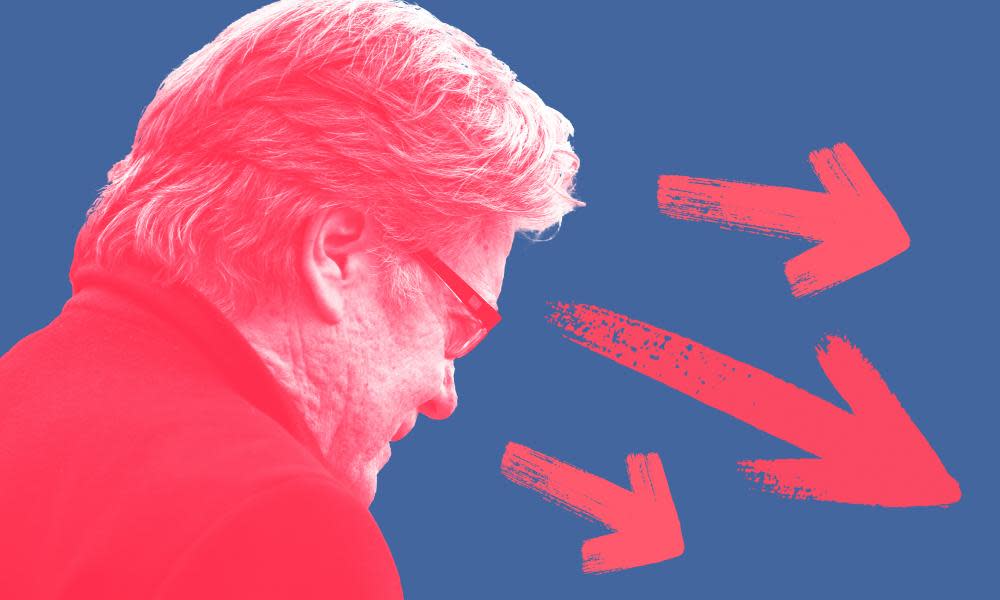Bannon's Europe plan: a look at the law in his 13 targeted countries

Steve Bannon Composite: Guardian Design team/EPA / Getty
Steve Bannon thought his offer to help nationalist, populist parties competing in the 2019 European elections would be irresistible. “I think we will get them all onboard,” he told the Guardian in July, shortly before his Brussels-based initiative, the Movement, was launched.
But research by the Guardian has shown that electoral law prevents the former Donald Trump strategist from providing polling services or other campaign support in most of the countries in which he wants to operate. Bannon’s organisation is completely barred or prevented from doing any meaningful work in nine of 13 countries on his target list, according to checks with electoral bodies and relevant ministries.
Only four EU countries could be part of the Bannon experiment: Italy, Denmark, Sweden and the Netherlands. Foreign organisations are barred from contributing to political parties in France, Belgium, Spain, Poland, the Czech Republic, Hungary and Finland.
In Germany and Austria, contributions from foreign sources are allowed, but caps are so low that Bannon’s largesse would be practically useless. In Austria, foreign donors are allowed to give political parties up to €2,641, while in Germany the limit is up to €1,000. German election law allows companies headquartered anywhere in the EU to make contributions, but that would not help Bannon as his operation is registered as non-profit, a category not included in Germany’s exemptions on foreign funding.
The restrictions even apply in Belgium, where Bannon’s foundation was registered in January 2017 by Mischaël Modrikamen, the leader of a fringe far-right party. In Belgium, private individuals may donate up to €500 or the equivalent in services to a political party each year, but organisations are barred from making contributions. Political parties risk a fine of up to €100,000 if they break the rules.
As a result, Modrikamen’s party, the Parti Populaire, which he runs from a mansion in the suburbs of Brussels, cannot receive contributions from the Movement, which has its headquarters in the same building.
Modrikamen’s wife, Yasmine Dehaene, fell foul of campaign spending rules in 2016 when the Alliance for Direct Democracy, a political group she ran that was dominated by the UK Independence party (Ukip), collapsed after it was asked to pay back €172,654 in EU grants and denied a further €248,345.
Laws are even stricter in France and Spain: contributions, in cash or in-kind, can only be made by nationals or residents of either country. Poland, Hungary and the Czech Republic have similarly strict laws, reflecting historical fears about foreign influence.
In Finland, there is a potential loophole. Foreign funding of political parties is banned, but “like-minded groups” from abroad are permitted to give up to €10,000 to each candidate running for office. However, the populist Finns party said it would “probably refuse” Bannon’s help.
Switzerland, which Bannon has visited, has no restrictions on foreign contributions, but as a non-EU country it will not be participating in the European elections. Norway – another non-EU country – has tighter rules.
In theory, parties in Denmark, Sweden, Italy and the Netherlands could be part of the Bannon European parliament experiment.
Denmark and Sweden have no restrictions on foreign funding, although the Swedish criminal code bars parties from accepting money from anyone “acting in the interest of a foreign power”, who is trying to influence public opinion on anything to do with security or “the foundations of the realm’s form of government”. But both the Danish People’s party and the Sweden Democrats – the two rightwing populist parties Bannon hoped to enlist – have both refused his offer of help.
Some experts fear determined individuals could evade legal restrictions. Loans to parties are not regulated in Austria, which means the ban on foreign contributions “could be easily circumvented”, said Mathias Huter at Parteispenden, an independent thinktank. However, both Austrian parties that Bannon’s team had hoped to recruit – the People’s party and its coalition partner, the Freedom party – have indicated they are not interested in his support.
That leaves only the Netherlands and Italy. Bannon has so far spent most of his time in Italy, which he has identified as the main focus of his efforts. Matteo Salvini, the interior minister and leader of the far-right League party, is the most high-profile European politician to unequivocally sign up to the project.
However, Italy’s government is contemplating a ban on foreign funding, amid growing concern about foreign influence, since restrictions were abolished in 2013. Francesco Galietti, an expert on Italian politics at Policy Sonar, a Rome-based consultancy, said Italy had “a giant loophole” in its electoral law compared with most other countries in Europe.

He predicted a ban on foreign funding would be passed into law in December or January.
Earlier this year, the Dutch government also promised to ban foreign funding of political parties, following a recommendation from an independent commission. “There is broad support in parliament already for this measure,” said Sarah de Lange, a professor in political science at the University of Amsterdam, a member of the commission.
Foreign money was not an issue in Dutch elections until it emerged that the American rightwing activist David Horowitz had contributed $150,000 to the anti-Islam MP Geert Wilders in two years. But any new Dutch law will not come into force in time for the European elections. Assuming Italy passes its laws clamping down on foreign interference in its elections, there will be only one European country where Bannon has a willing partner that is legally permitted to accept his help: the Netherlands.
Additional reporting by Kim Willsher in Paris, Josie Le Blond in Berlin, Sam Jones in Spain, Angela Giuffrida in Rome, Shaun Walker in Budapest, Christian Davies in Warsaw and Robert Tait in Prague.

 Yahoo News
Yahoo News 
